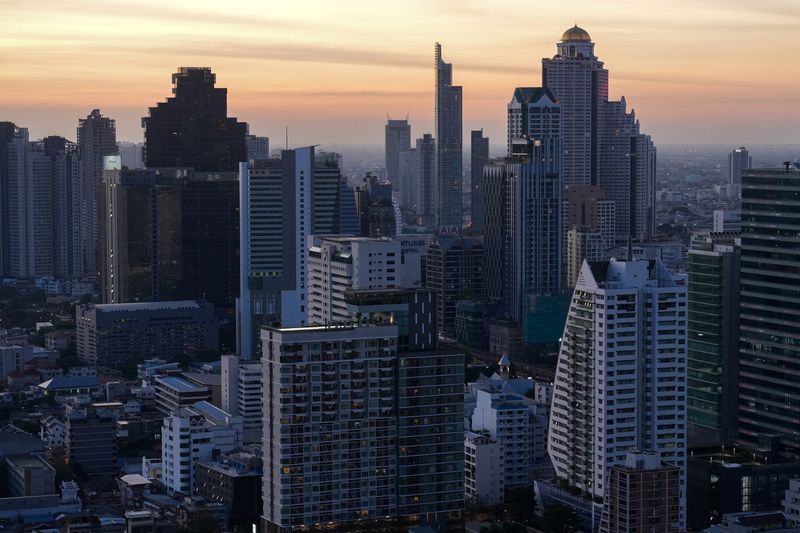
© Reuters. Skyscrapers are photographed against the setting sun in Bangkok, Thailand, January 4, 2023. REUTERS/Athit Perawongmetha/File Photo
By Orathai Sriring and Kitiphong Thaichareon
BANGKOK (Reuters) – Thai Prime Minister Srettha Thavisin said on Monday four consecutive months of negative inflation were a sign of economic weakness and called for fiscal and monetary policy coordination, raising pressure on the central bank to ease monetary policy.
Thailand’s headline consumer price index (CPI) fell 1.11% in January from a year earlier, data showed on Monday, versus a forecast drop of 0.82% in a Reuters poll.
The decline in January was the fourth in as many months and was driven by government energy subsidies, lower food prices, and last year’s high base, the commerce ministry said.
“It’s a sign of economic weakness,” Srettha said, adding fiscal and monetary policy must go together, otherwise “it would be difficult to solve the problem”.
It was the ninth straight month that headline inflation was below the central bank’s target range of 1% to 3%.
Srettha has urged the central bank to cut the key rate, currently at a more than decade-high of 2.50%, to help Southeast Asia’s second-largest economy he says is in crisis.
Earlier on Monday, Deputy Finance Minister Julapun Amornvivat shared a similar view, saying low inflation was worrying while high interest rates were the people’s burden and the central bank should help address the problem.
Four consecutive months of negative inflation mean “purchasing power is disappearing,” he said.
Despite lower inflation and government pressure on the Bank of Thailand (BOT) to ease policy, it is expected to leave its policy rate unchanged on Wednesday, a Reuters poll showed.
BOT Governor Sethaput Suthiwartnarueput recently told Reuters the current policy rate was “broadly neutral” and the economy was not in crisis.
The BOT left its key rate steady at its November review, having raised it by 200 basis points since August 2022 to curb inflation.
The commerce ministry predicted headline CPI would fall 0.7% year-on-year in the first quarter, with government measures to lower living costs the main factor.
“There is still no deflation yet as the core rate remains positive,” Poonpong Naiyanapakorn, head of the ministry’s trade policy and strategy office, told a briefing.
The core CPI, which stripe out fresh food and energy prices, rose 0.52% year-on-year in January, versus a forecast rise of 0.57%.
For 2024, the ministry maintained its forecast for headline inflation at between -0.30% and 1.7%, after last year’s 1.23%.
(This story has been refiled to add a dropped word ‘negative’ in paragraph 1)




